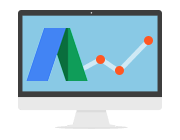Reducing PPC Costs on Google AdWords
Reducing pay-per-click (PPC) costs on Google AdWords can help improve the ROI of your online advertising campaigns. PPC is a popular method of advertising on Google, as it allows businesses to only pay for the ad clicks they receive. However, PPC costs can quickly add up, especially if your ads aren’t generating enough conversions to offset the cost. Here are some tips for reducing your PPC costs on Google AdWords:
Using Negative Keywords
Use negative keywords: Negative keywords allow you to exclude certain search terms from triggering your ads. For example, if you’re a plumber, you may want to use negative keywords like “DIY” or “free” to prevent your ad from showing up for searches related to do-it-yourself plumbing repairs or free plumbing services. This can help ensure that your ads only show up for relevant searches, which can help increase the chances of getting clicks from potential customers.
Choosing the Right Match Type
Use match types wisely: AdWords offers several different match types for your keywords, including broad match, phrase match, and exact match. Broad match will show your ad for the broadest range of searches, while phrase and exact match will only show your ad for more specific searches. Using the right match type can help ensure that your ad is only shown to users who are likely to be interested in your product or service, which can help reduce the number of irrelevant clicks you receive.
Optimizing Your Ad Copy and Landing Page
Optimize your ad copy and landing page: The ad copy and landing page you use can have a big impact on the success of your PPC campaigns. Your ad copy should clearly communicate the value of your product or service and should include a call to action that encourages users to click on your ad. Your landing page should also be well-designed and easy to navigate and should provide users with the information they need to make a purchase decision. By optimizing your ad copy and landing page, you can increase the chances of getting conversions from your PPC ads, which can help reduce your overall costs.
Utilizing Ad Extensions
Use ad extensions: Ad extensions are additional pieces of information that can be added to your PPC ads, such as your business location, phone number, or additional links to specific pages on your website. Ad extensions can help improve the visibility and relevance of your ads, which can help increase the chances of getting clicks. Additionally, ad extensions can help you take up more space on the search results page, which can help your ad stand out from the competition.
Regularly Monitoring and Adjusting Your Campaigns
Monitor and adjust your campaigns regularly: PPC costs can vary depending on a number of factors, such as the competitiveness of your keywords, the quality of your ad copy, and the relevance of your landing page. It’s important to regularly monitor the performance of your PPC campaigns and make adjustments as needed. This can include testing different ad copy and landing page variations, adjusting your bid amounts, and adding or removing keywords from your campaigns. By regularly monitoring and adjusting your campaigns, you can help ensure that you’re getting the best possible return on your advertising spend.
Optimizing Your PPC Campaigns for Maximum ROI
Overall, reducing PPC costs on Google AdWords requires a combination of strategies and tactics. By using negative keywords, matching types wisely, optimizing your ad copy and landing page, using ad extensions, and regularly monitoring and adjusting your campaigns, you can help reduce your PPC costs and improve the ROI of your online advertising efforts.








